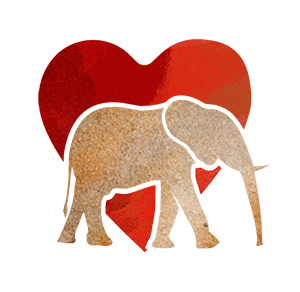Mount Kenya straddles the equator just 193 kms north of Nairobi and is the second highest peak in Africa at 17,057ft. An ancient extinct volcano whose period of activity dates back to 3 million years ago it is deeply dissected into valleys radiating from the peaks capped with equatorial snow. The mountain’s base is 96 kms wide and, due to altitude and rainfall changes, the vegetation varies enormously. There are 20 glacial tarns (mountain lakes) and unique mountain vegetation, including the giant groundsel at high altitude, crystal clear mountain streams then tumble down through verdant forest and bamboo in the lower altitude reaches. The forest falls between National Park (formed in 1949) and Forest Reserve, a combined 1,420 square kilometers and is where the elephants, buffalo and giant forest hogs, to name just some of the mammals of the area, can be found. At lower altitudes the Park and Forest Reserve border on heavily populated areas, as the volcanic sediment in the surrounding regions provide fertile soil, and this coupled with the huge volume of water makes for favorable agriculture lands.
![]()
![]()
It is very likely that this calf’s elephant herd strayed into the community lands around the Judea area, near Meere river, and in the ensuing human conflict the mother was either injured and later died, or the calf was left behind in the chaos. The villagers had observed the calf alone in the area for three days before reporting it to the authorities, and a wound between his shoulder blades indicates that they also tried to kill him. His presence was reported to KWS Platoon Commander Mt. Kenya, Mr. James Kailangush, who responded in time to rescue the baby as many local villagers were milling around it with ill intent. Having already reported this to us through Dr. Mutinda they proceeded to capture the calf with rangers from the Kenyan Wildlife service and Scouts for the Mount Kenya Trust, along with the aid of some helpful community members too.
In the meantime from DSWT’s Nairobi HQ the rescue team, comprising of our experienced Keepers, took off from Wilson airport in a Cessna Caravan, for the short 35 minute flight to Nanyuki airstrip where the calf was driven to by KWS. Once in Nanyuki, the calf still conscious and strapped down in the vehicle, our Keepers were able to take a close look at the injuries and ascertain that they were not as deep as originally thought. Having cleaned the wound, and prepared the calf for the flight he was loaded onto the aircraft and flown back to Wilson, arriving late evening at the Nairobi Nursery.
He has been named Teleki, fittingly a name synonymous with Mount Kenya. Count Samuel Teleki led the first expedition to penetrate the forest zone of Mount Kenya in 1887 and his expedition entered the mountain’s jungles through a valley later named Teleki in his honor. Seen as a Holy Mountain by all the communities living in the central highlands around Mt. Kenya, the Kikuyu tribe firmly believe that God Ngai and his wife Mumbi live on the peaks. So to some saving this calf was very important, while others saw him as a source of free meat – but he owes his life to many compassionate and dedicated people who did much to ensure he was bought into our care, hopefully to have a second chance at life, this time not in the forested valleys of Mt. Kenya, but in the arid vast wilderness of Tsavo.
![]()
This journey will be taken together with his new Nursery elephant friends, who in time will replace the lost family he still remembers. Amongst them is a special friend, Kihari, also rescued from Mt. Kenya, who will always share along with him the same dim memories of forested misty mountain slopes.






























